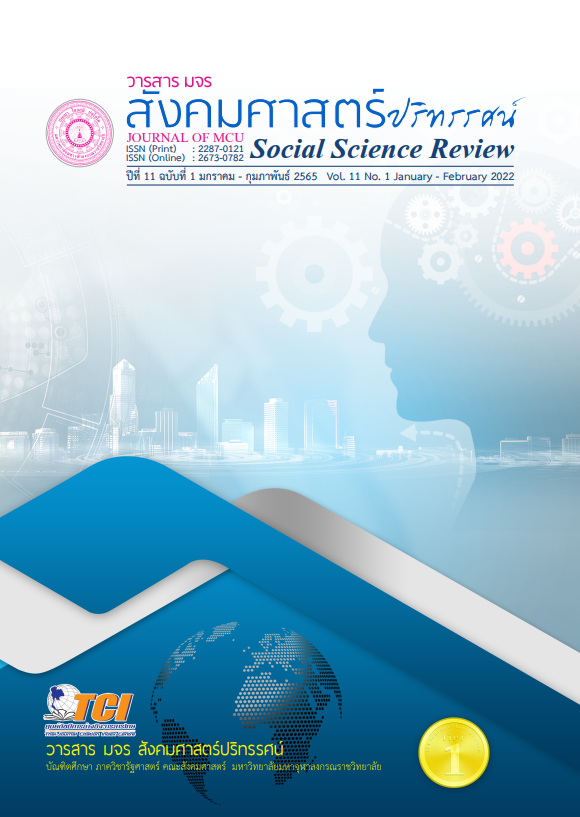การพัฒนากระบวนทัศน์และความเข้าใจทางพหุวัฒนธรรม กับการอยู่ร่วมกันอย่างสันติ
คำสำคัญ:
กระบวนทัศน์, พหุวัฒนธรรม, การอยู่ร่วมกันอย่างสันติบทคัดย่อ
บทความการวิจัยเชิงปฏิบัติการนี้มีวัตถุประสงค์เพื่อพัฒนาและเสนอแนวปฏิบัติในการพัฒนากระบวนทัศน์และความเข้าใจทางสังคมพหุวัฒนธรรมกับการอยู่ร่วมกันอย่างสันติ ผ่านกระบวนการเก็บข้อมูลจากการศึกษาเอกสารและงานวิจัยที่เกี่ยวข้อง การสัมภาษณ์แกนนำในระดับชุมชนและระดับนโยบาย 96 รูป/คน และการจัดกิจกรรม ด้วยเทคนิค A-I-C และประเมินผลด้วยเทคนิค AAR
ผลการวิจัยพบว่า 1. การพัฒนากระบวนทัศน์และความเข้าใจทางสังคมพหุวัฒนธรรมกับการอยู่ร่วมกันอย่างสันติจะต้องดำเนินการใน 5 มิติ คือ 1) การป้องกันการเข้าใจผิดซึ่งกันและกัน 2) การสร้างความเสมอภาค เท่าเทียม ยุติธรรม และเป็นธรรม 3) การสร้างความสามัคคี 4) การส่งเสริมความซื่อสัตย์ ซื่อตรง จริงใจ และเสียสละ 5) การสนับสนุนการอยู่ร่วมกันบนพื้นฐานความแตกต่างแต่ไม่แตกแยก และ 2. แนวปฏิบัติควรส่งเสริมสนับสนุนให้ผู้คนประพฤติปฏิบัติตามหลักบัญญัติ 10 ประการ คือ 1) การยึดมั่นในคำสอนของศาสนา 2) การเห็นคุณค่าและเคารพศักดิ์ศรีความเป็นมนุษย์ 3) การยอมรับและเคารพในความแตกต่างระหว่างบุคคล 4) การเคารพสิทธิและเสรีภาพของตนเองและผู้อื่น 5) การมีความเสมอภาคและความยุติธรรม 6) การยึดถือประโยชน์ของส่วนรวมเป็นสำคัญ 7) การมีจิตสำนึก จิตอาสา และจิตสาธารณะ 8) การรู้หน้าที่ มีความรับผิดชอบ 9) การมีวิจารณญาณในพูดและการแสดงความคิดเห็น และ 10) การแก้ไขความขัดแย้งด้วยสันติวิธี
เอกสารอ้างอิง
จุฑาทิพย์ ภัทราวาท. (2553). การวิจัยเชิงปฏิบัติการแบบมีส่วนร่วม. กรุงเทพฯ: โรงพิมพ์มหาวิทยาลัยเกษตรศาสตร์.
พระมหานภดล ปุญฺญสุวฑฺฒโก. (2560). การอยู่ร่วมกันของคนในสังคมพหุวัฒนธรรม: กรณีศึกษาชุมชนเขตบางรัก กรุงเทพมหานคร (รายงานการวิจัย). พระนครศรีอยุธยา: สถาบันวิจัยพุทธศาสตร์.
พระมหามงคลกานต์ ฐิตธมฺโมและคณะ. (2562). การอยู่ร่วมกันของคนในสังคมพหุวัฒนธรรมในประเทศไทยกรณีศึกษาสังคมพหุวัฒนธรรมในอำเภอเมือง จังหวัดเชียงใหม่. วารสารมหาจุฬาวิชาการ, 6(2), 46-59.
พระราชรัตนสุธี (ขวัญรัก เกษรบัว). (2563). วิเคราะห์ความสัมพันธ์ของภาครัฐ เครือข่ายทางสังคม และองค์กรชุมชนกับการขับเคลื่อนการพัฒนาเชิงพื้นที่สี่แยกอินโดจีน. วารสารวิจยวิชาการ, 3(3), 1-12.
ลำพอง กลมกูล. (2561). พหุวัฒนธรรมทางศาสนากับแนวทางการอยู่ร่วมกันของจีนและมลายู: กรณีศึกษาประเทศบรูไน. วารสารโพธิวิจัย มหาวิทยาลัยศรีนครินทรวิโรฒ, 2(2), 76-90.
วันชัย วัฒนศัพท์. (2550). ความขัดแย้ง: หลักการและเครื่องมือแก้ปัญหา (พิมพ์ครั้งที่ 3). นนทบุรี: สถาบันพระปกเกล้า.
วาสนา พิทักษ์ธรรม และคณะ. (2559). การอยู่ร่วมกันอย่างสันติสุขที่ยั่งยืนในสังคมพหุวัฒนธรรม กรณีศึกษา องค์การบริหารส่วนตำบลกระโด อำเภอยะรัง จังหวัดปัตตานี. อุบลราชธานี: มหาวิทยาลัยราชธานี.
Filley, A. C. (1975). Interpersonal Conflict Resolution. Glenview, Illinois: Scott Foresman.
Galtung, J. (1996). Peace by Peaceful Means: Peace and Conflict, Development and Civilization. London: SAGE Publications Ltd.
Shaffer, L. F., & Shoben, E. J. (1965). The Psychology of Adjustment. Boston: Houghton Miffin.
ดาวน์โหลด
เผยแพร่แล้ว
รูปแบบการอ้างอิง
ฉบับ
ประเภทบทความ
สัญญาอนุญาต
ลิขสิทธิ์ (c) 2022 วารสาร มจร สังคมศาสตร์ปริทรรศน์

อนุญาตภายใต้เงื่อนไข Creative Commons Attribution-NonCommercial-NoDerivatives 4.0 International License.
เพื่อให้เป็นไปตามกฎหมายลิขสิทธิ์ ผู้นิพนธ์ทุกท่านต้องลงลายมือชื่อในแบบฟอร์มใบมอบลิขสิทธิ์บทความให้แก่วารสารฯ พร้อมกับบทความต้นฉบับที่ได้แก้ไขครั้งสุดท้าย นอกจากนี้ ผู้นิพนธ์ทุกท่านต้องยืนยันว่าบทความต้นฉบับที่ส่งมาตีพิมพ์นั้น ได้ส่งมาตีพิมพ์เฉพาะในวารสาร มจร สังคมศาสตร์ปริทรรศน์ เพียงแห่งเดียวเท่านั้น หากมีการใช้ภาพหรือตารางหรือเนื้อหาอื่นๆ ของผู้นิพนธ์อื่นที่ปรากฏในสิ่งตีพิมพ์อื่นมาแล้ว ผู้นิพนธ์ต้องขออนุญาตเจ้าของลิขสิทธิ์ก่อน พร้อมทั้งแสดงหนังสือที่ได้รับการยินยอมต่อบรรณาธิการ ก่อนที่บทความจะได้รับการตีพิมพ์ หากไม่เป็นไปตามข้อกำหนดเบื้องต้น ทางวารสารจะถอดบทความของท่านออกโดยไม่มีข้อยกเว้นใดๆ ทั้งสิ้น





